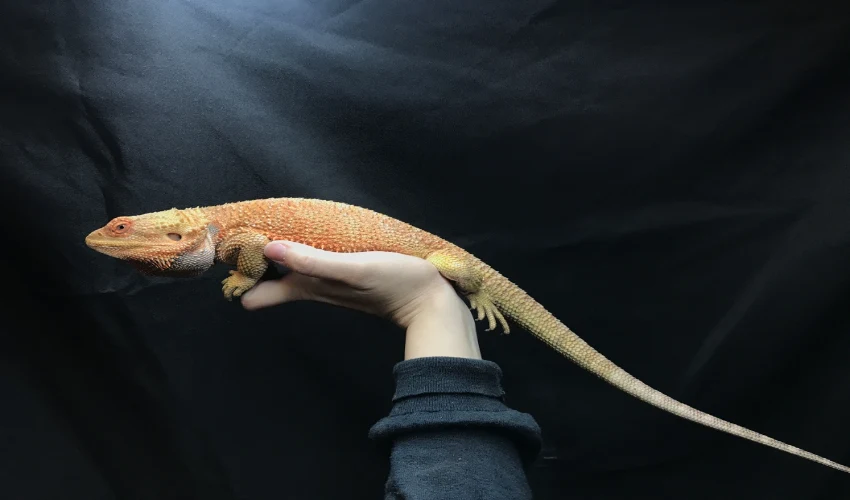The German Giant Bearded Dragon is an impressive and beloved reptile known for its large size, friendly nature, and vibrant appearance. If you are a proud owner of one of these magnificent creatures, ensuring their health and well-being is paramount. These reptiles are relatively low-maintenance compared to other exotic pets, but they still require specific care to thrive. Below are seven essential health tips that will help you keep your German Giant Bearded Dragon happy and healthy for years to come.
- Provide a Proper Diet
A balanced diet is essential to maintain the health of your German Giant Bearded Dragon. These dragons are omnivores, meaning they require both plant and animal-based foods. Their diet should consist of:
- Insects: Crickets, dubia roaches, and mealworms are great protein sources for your bearded dragon.
- Leafy Greens: Offer a variety of greens, such as collard greens, mustard greens, and dandelion leaves.
- Fruits: Occasionally, offer fruits like strawberries, blueberries, and melons in moderation.
- Supplementation: Ensure you provide calcium and multivitamin supplements to prevent nutritional deficiencies.
It’s crucial to avoid feeding them iceberg lettuce, as it contains little nutritional value, and avoid high-fat foods that can lead to obesity.
- Maintain the Right Temperature and Lighting
A proper heating setup is vital for the health of your German Giant Bearded Dragon. Bearded dragons are cold-blooded and require external heat sources to regulate their body temperature. A suitable temperature range for a german giant bearded dragons for sale is:
- Basking Spot: 100-110°F (38-43°C)
- Cool Side: 75-85°F (24-29°C)
- Nighttime: No lower than 65°F (18°C)
Additionally, your bearded dragon needs UVB lighting to synthesize vitamin D3, which is essential for calcium absorption. Use a high-quality UVB bulb and ensure that it’s positioned correctly in the enclosure to provide proper exposure.
- Create an Adequate Habitat
A suitable enclosure is necessary for your bearded dragon’s overall health. A large terrarium or vivarium will allow them ample space to move around, bask, and hide. For a German Giant Bearded Dragon, the minimum recommended tank size is 75 gallons, but a larger tank is preferable, especially as they grow.
- Substrate: Avoid loose substrate like sand, as it can lead to impaction if ingested. Instead, opt for reptile carpet or slate tiles.
- Climbing Structures: Include branches, rocks, and logs for climbing and basking. Bearded dragons enjoy perching at different heights.
- Hiding Spots: Offer hiding spots to give them a sense of security and privacy, which is essential for their mental health.
- Hydration is Key
While bearded dragons are desert creatures, they still require proper hydration. Make sure they have access to fresh, clean water daily. They might not drink from standing water frequently, but misting the tank or providing a shallow water dish can encourage them to hydrate. Bearded dragons will often drink droplets from the tank’s walls or their leaves, so ensure the water dish is shallow and accessible.
Dehydration can lead to a variety of health problems, including kidney issues, so it’s important to monitor their water intake closely.
- Exercise and Mental Stimulation
German Giant Bearded Dragons are active reptiles that need space to explore and exercise. Ensure they have room to move around outside of their enclosure in a safe, controlled environment. Allowing them to roam in a secure room or an outdoor, enclosed area is a great way to provide mental stimulation and physical exercise.
You can also enrich their environment by introducing various items like toys, tunnels, or safe plants. This keeps them mentally sharp and helps prevent stress-related behaviors like excessive pacing or lethargy.
- Monitor for Health Issues
Regularly check your German Giant Bearded Dragon for any signs of illness. Bearded dragons are generally hardy creatures, but they can suffer from common health issues like:
- Respiratory Infections: Symptoms include wheezing, labored breathing, or nasal discharge.
- Mouth Rot: Look for signs of swelling or sores around the mouth.
- Impaction: If your bearded dragon is not defecating or seems lethargic, impaction could be a concern, typically caused by ingesting substrates or large food items.
Any changes in behavior, appetite, or physical appearance should be taken seriously and may require a visit to a reptile veterinarian.
- Regular Vet Check-ups
Regular veterinary check-ups are crucial, especially if you notice any signs of illness. A reptile-savvy vet can provide essential health screenings, including checking for parasites, skin issues, or other potential health concerns. Additionally, they can guide you on proper care practices and help identify any emerging health issues before they become serious.
Bearded dragons can live up to 10-15 years with proper care, and maintaining their health through routine vet visits ensures a long, happy life.
Conclusion
Caring for a German Giant Bearded Dragon requires attention to detail, but the rewards of having a healthy, happy pet are immeasurable. By following these seven essential health tips—providing a proper diet, maintaining the right temperature and lighting, creating an adequate habitat, ensuring hydration, encouraging exercise, monitoring for health issues, and scheduling regular vet visits—you can help your German Giant Bearded Dragon live a long, fulfilling life. With the right care, these magnificent reptiles will continue to bring joy and companionship to your life for years to come.
